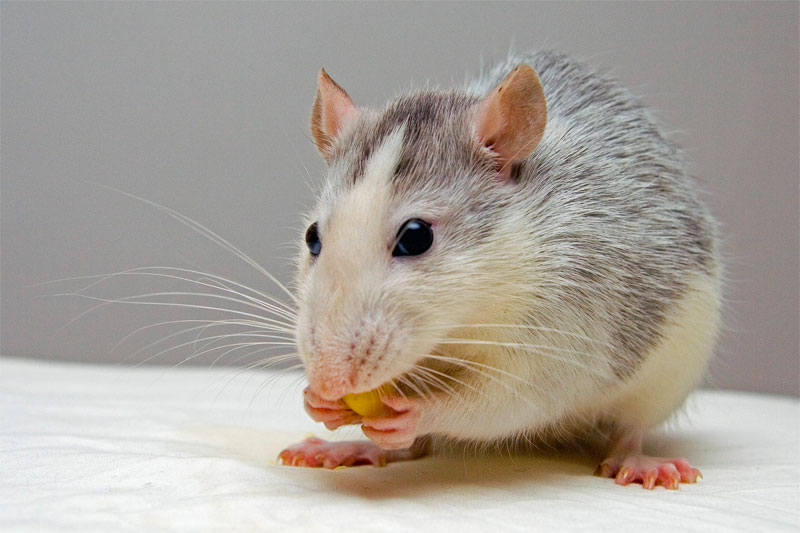“Hi Alison, do you have room for another garden gnome?”

The coordinator of the local rat rescue wasn’t worried about my garden design.
Garden gnomes are our code for pet fancy rats found in the wild, picked up by a kind-hearted member of the public or in the most recent case, dumped over a fence in a bucket.
Sometimes these animals have escaped from their homes, but it is fairly unusual that an owner comes forward. Far more often the rats are deliberately dumped.
The fateful call of the wild
Anyone familiar with animal rescue will have heard stories about animals being cast off like rubbish – the kitten hurled out a car window in a bag, the dog found tied to a fence post, the cage of rabbits abandoned in a parking lot.
Some animals, like the car window kitten who landed on the drive of my childhood home, are dumped simply because the previous owner doesn’t care. However, another tranche fall victim to the mistaken belief that the wild is, if not the best place, then at least the natural place for any animal.
Of course, this is not true. The whole point of a pet is that they are domesticated. Generations of breeding has made them tamer, reduced the survival instincts needed in the wild, and changed physical shape and appearance. They are adapted for a life with humans, not fending for themselves. Some survive, but countless others will die quickly, the victims of roads, poison or predators.
Where dumped animals do survive, they can cause havoc for wildlife and local ecosystems as any scientist addressing the problem of feral cats in Australia and New Zealand can tell you.
Ready To Adopt A Rat? Find a rat rescue near me!
The stigma of being a rat
Although all types of animals can be, and are, dumped, rats are particularly common victims for three reasons, all inter-connected and all coming back to public perception of this most maligned of species.
“It’s just a rat” – plenty of people, even some owners of pet rats, don’t see these 400g bundles of fur and goofiness as animals as worthy of care as a dog or a cat. They are small, they are cheap to buy (and much more expensive to take to the vet), and, well, they are rats right? Who cares about a rat?
“It’s a rat, it will cope” – rats are one of the world’s most adaptable species, possibly second only to humans. They get everywhere, they eat anything. So, goes the logic, a pet rat will be able to cope in the wild. It’s a rat. It will be fine. However, while some dumped rats do manage to integrate into wild populations, the majority, with coat colors bred for human taste rather than camouflage and no experience of predator avoidance, are dumped to meet near certain death. I’ve kept a lot of rats over the last 18 years, and in all honesty, some of these animals have the predator awareness of a marshmallow. And why should they be good at fight or flight? Their entire lives have been in a safe environment, and they’ve been bred from lines selected to be confident and friendly – great traits for pets and a disaster in the wild.
“I don’t want to dump it, but there is nowhere else to take it” – personally I don’t think there are many excuses for dumping an animal in the wild. Even in the absence of a suitable rescue, handing them in to a vet is more humane. However, it certainly is the case that in some regions, finding a rescue that takes rats seriously is a hurdle. Whilst in the UK almost all major rescue centers accept any type of small animal, in other countries it can be more hit and miss. Some centers regrettably share the wider view – it’s just a rat. Which brings me back to the point of the post – rats need rescues too.
The perfect pet
Rats are in my opinion pretty much the best small animal / caged pet, and society – owners, rescues, vets and all – should value them more. Yes, I’m biased – my life has been governed by the fuzzy geniuses for years – but evidence is on my side.
Intelligence – rats are bright. They can learn training and tricks, solve puzzles and mazes and recognize different people. Some may even say rats can be smarter than people. There is also the fact that some rats are actually heroes and save lives as a job!
Emotions – I don’t think we’ve got to the bottom of what rats are capable of feeling and thinking, but even sticking to the science, we know they are capable of empathetic and altruistic action. The survivor of a bonded pair will often go through a period of behavioral depression that is arguably grief. A terrifying event (say, being dumped in the wild when albino and blind, then being found by a dog, as happened to one of my lucky garden gnomes) can induce complex fear behaviors. Those small pointy heads contain remarkably complex grey matter.
They want to bond with us – even wild rats are not particularly human averse. They live in our environments and can be pretty bold. Offered inducement and opportunity, some wild born rats will become at least partially tame. That means their domestic born cousins, selected for all the traits that make a pet, actively want to be our friends. Humans are fun. Quite apart from our role as bringers of food, we are climbing frames, sources of cuddles and scritches, and playmates. My Mr W won’t let his humans enter or leave a room without sitting on their foot to demand a cuddle first. He’s another garden gnome, who when dumped found a doorstep to sit on until someone picked him up. We often get the impression he’s checking that we’re not abandoning him too.
Rats need rescues too
There is a line in one of Sir Terry Pratchett’s Tiffany Aching books – “We control their births, we control their deaths. In between, we have a duty.”
That’s Granny Aching, a shepherdess, talking about farming, but it applies to any domestic animal. If we choose to breed them, buy them, or adopt them, in taking an animal on, we create a duty. A duty to care for them, and keep them safe from harm, fear and pain. Of course, sometimes giving a pet up is in the owner’s or the animal’s best interests, and I would never judge that. The duty is not to keep the animal come what may, but to ensure it goes to a safe refuge.
And the safest refuge is often a well-run animal rescue. They can provide immediate care, have access to vet treatment, and can check out future owners before rehoming. It takes a certain amount of courage to walk into a rescue and tell someone you can no longer keep your pet, certainly more courage than to drop a confused animal on the curbside. But whether the pet is a pedigree dog, or a rat that cost $5, it’s the least they deserve.
So, how can we encourage people to keep their unwanted pets safe? Support good quality rescues so they have the means to take in more animals. If your local rescue has categories of animals it can’t or won’t take, engage them in constructive conversation about why – what options are there via foster carers or specialist rescues they could collaborate with to direct more unusual pets into safe harbor. And of course, keep raising awareness of the value of all types of pets, and the risks of releasing domestic animals into the wild.
Wild animals belong in the wild. Pets don’t.


Thank you for this article on rats. They are absolutely wonderful, adorable and precious little beings. So deserving of kindness, love, and respect.
Could not agree more Lori! I love mice and rats and wish more people could see them in the same way I do!
Need help finding a home for two rats don’t want to kill or let them go but with me being asthma it’s hurting me
Hi Jennifer – you would need to look for local rescues or shelters, unfortunately we would not be able to help you.
Hello,
I’ve been seeing small dark blue rats coming around my bird feeder- are these wild? or are they fancy rats that I been dumped. I live in a town across the lake from New Orleans.
Hi Karen – I am not sure to be honest. There is something called a Russian blue rat – but in your area there is also a rat called a swamp rat – or nutria rats. They are rather large — take a peak online and see if that may be what they are or do a search for Russian blue rat! I would recommend also seeing if you have a local rat rescue that may be able to help if you can grab a picture!
Hello. I have a problem. I found a hairless rat at my work and I know it’s domesticated and been dumped. I’ve been feeding and keeping it safe for almost a month now but the boss says it’s got to go. It’s living in a pipe that goes underground and I’m concerned “he” may be a “she” as we didnt see it for a few days and now it takes any bit of food down into the pipe. I’ve researched everything in my area but can’t find somewhere to bring it. Please help me if you can thank you!
Hi Rebecca, not sure how I can really help? Did you contact your local SPCA or animal control? Those would be the only resources I could think of to help you! Thanks for caring for her/him! Jill